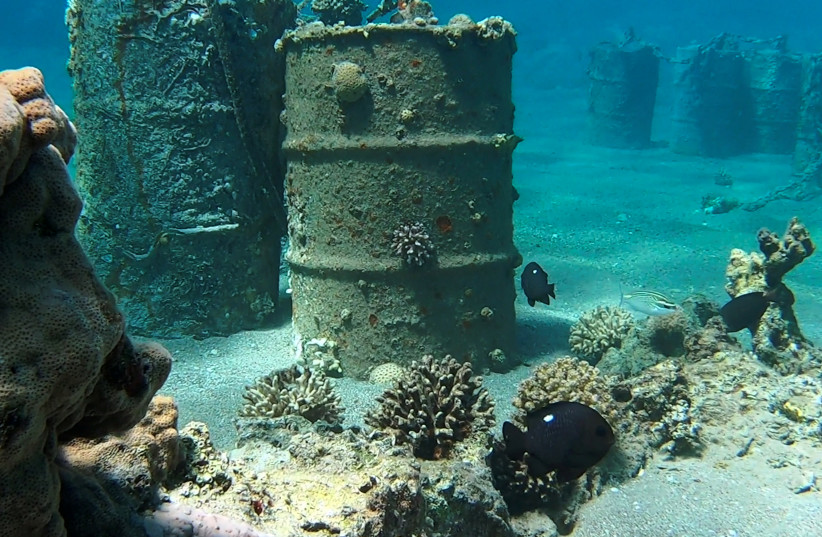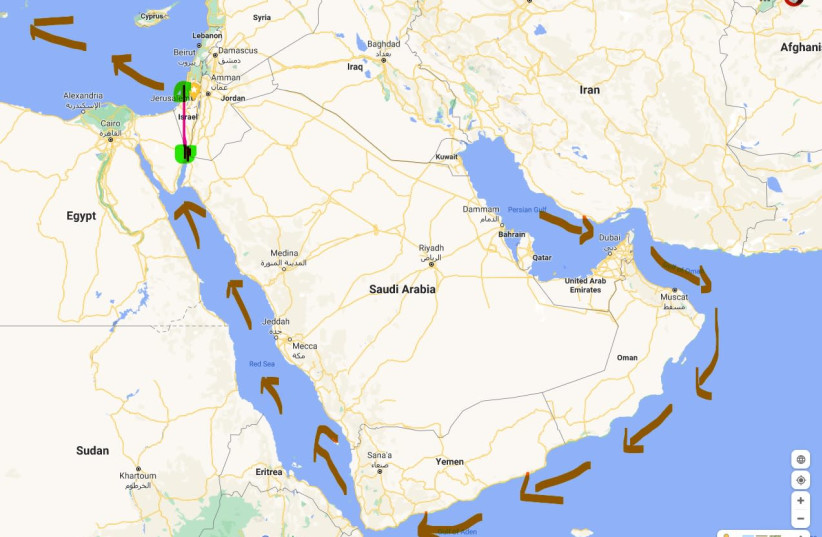“We blocked the entry of dozens of oil tankers into the Gulf of Eilat,” Environmental Protection Minister Tamar Zandberg said in a statement.
By REUTERS Published: DECEMBER 16, 2021

Israel’s Environmental Protection Ministry said on Thursday that it had blocked a deal with partners from the United Arab Emirates to transport oil from the Gulf to Europe via an Israeli port city that houses a fragile coral reef.
The announcement could lead to the cancellation of the deal, one of the biggest to emerge from the normalization of ties between Israel and the UAE last year. Environmentalists had petitioned Israel’s Supreme Court to block the agreement.
Signed between an Israeli state-owned company and a venture with Emirati and Israeli owners, the deal allows for oil unloaded from tankers in the Red Sea port of Eilat to be moved across Israel in an existing pipeline to the Mediterranean coast.
Responding to the Supreme Court petition, Prime Minister Naftali Bennett’s government said it would not intervene and would instead allow the Environmental Protection Ministry to play its regulatory role limiting activities that pose ecological risks.
“We blocked the entry of dozens of oil tankers into the Gulf of Eilat,” Environmental Protection Minister Tamar Zandberg said in a statement, adding that Israel “will not become a bridge of pollution in an era of the climate crisis”.
Israel’s energy minister had previously come out against the deal, also over environmental concerns.The Israeli state-owned company involved in the deal, Europe Asia Pipeline Company (EAPC), said the deal has “significant geopolitical and economic advantages for Israel and its citizens.”
EAPC said it was committed to protecting the environment and would continue its dialogue with the Environmental Protection Ministry over its pipeline activities. The other company involved in the deal, MED-RED Land Bridge, did not immediately provide a comment.
===========================
 Photo: AFP
Photo: AFP
Environment Ministry blocks oil pipeline deal with UAE – YNET
Announcement could lead to cancellation of agreement, slammed by activists for ecological risks; deal one of the biggest to emerge from normalization of ties between Jerusalem and Abu Dhabi last year
Reuters | Published: 12.16.21
The Environmental Protection Ministry said on Thursday that it had blocked a deal with partners from the United Arab Emirates to transport oil from the Gulf to Europe via an Israeli port city that houses a fragile coral reef.
The announcement could lead to the cancellation of the deal, one of the biggest to emerge from the normalization of ties between Israel and the UAE last year. Environmentalists had petitioned the Supreme Court to block the agreement.
Signed between an Israeli state-owned company and a venture with Emirati and Israeli owners, the deal allows for oil unloaded from tankers in the Red Sea port of Eilat to be moved across Israel in an existing pipeline to the Mediterranean coast.Responding to the Supreme Court petition, Prime Minister Naftali Bennett’s government said it would not intervene and would instead allow the Environmental Protection Ministry to play its regulatory role limiting activities that pose ecological risks.

(Photo: Kobi Konaks)
“We blocked the entry of dozens of oil tankers into the Gulf of Eilat,” Environmental Protection Minister Tamar Zandberg said in a statement, adding that Israel “will not become a bridge of pollution in an era of the climate crisis”.
The minister had previously come out against the deal, also over environmental concerns.The two companies involved in the deal – Israel’s Europe Asia Pipeline Company (EAPC), and MED-RED Land Bridge – did not immediately provide comment.
https://www.ynetnews.com/environment/article/ryriwgy9t
====================
Israel Tells Court It Won’t Revoke UAE Oil Pipeline Deal, but Might Set Restrictions – Haaretz
Environmental Protection Ministry says will reserve the right to restrict volume of oil handled
Zafrir Rinat Dec. 16, 2021

The state told the High Court of Justice on Thursday that it will not block an agreement the Europe Asia Pipeline Company made with an Emirati firm to transport more oil through Eilat and Ashkelon ports. But it also said the Environmental Protection Ministry reserved the right to restrict the volume of oil transported through Israel.Haaretz Weekly Podcast
The statement was made in response to a petition filed by environmentalists urging the court to block the agreement. The Society for the Protection of Nature, Zalul and Adam Teva V’Din demanded the revocation of the agreement because it had not been approved by the government, and due to the harsh repercussions its implementation could have on the marine environment and the beaches, in case of an oil leak.
The EAP signed the agreement about a year ago and its implementation is expected to significantly increase the volume of oil transported through Israel to various world markets.
The Environmental Protection Ministry recently said it will not increase the amount of oil EAP may transport, in keeping with the toxins permit it had been given, which determines the maximum amount of hazardous substance any company may keep. The ministry’s decision stems from experts’ opinion that the Eilat gulf should not be burdened with an additional risk.
The ministry also rejected EAP’s emergency plan to deal with sea pollution. The plan’s approval was a condition of expanding the scope of oil transportation.
According to the EAP’s business license and toxins permit, only six oil tankers may dock in the company’s ports every year, carrying a load of oil that doesn’t exceed two million tons. Implementing the new agreement would lead to the transport of 30 tankers a year, carrying tens of millions of tons of oil.
The EAP intends to fight in court against the Environmental Protection Ministry’s policy. In a letter the company’s lawyers sent the ministry’s director general last month, they claimed the ministry’s restrictions exceed its authority. The ministry is not authorized to determine the scope of EAP’s activity, but only to set the terms the company must fulfill to maintain environmental demands, it said.
The ministry’s legal advisor Dalit Dror wrote in response that no one has “a reserved right to operate a business in any scope it wants, insofar as it could have repercussions on the environment and the public.”
Dror wrote that the ministry’s zero-added-risk policy is customary in other countries, such as the United States and Canada. Those two states imposed restrictions on the movement of oil tankers in environmentally sensitive regions, she wrote.
The EAP commented that “after months of slander and groundless arguments against the agreement, the state’s position in its response to the High Court of Justice, in the name of all the respondent ministries, proves again that the EAP has been and is operating in keeping with the law and the state agencies’ instructions and in cooperation with them. Also, that the Med Red contract and its implementation is part of the company’s core routine activity since its foundation.”
EAP also said “the clear and firm position of the Finance Ministry and Israel Corporations Authority is that the EAP acted as it was expected to, to develop the company’s business activity with international clients. And also that the agreement has significant geopolitical and economic advantages for Israel and its citizens.”
The company said it would “preserve the environment, and nature and marine assets … with all means at its disposal and in keeping with instructions of the relevant officials.”
